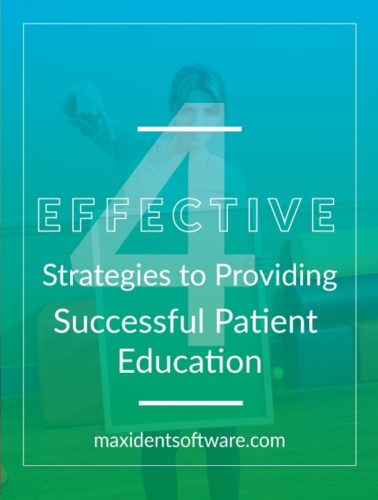
Patient education is paramount to the success of your practice. That cannot be said often or incessantly enough. But why is it so important? The entire concept of patient education is centered around the most important element to your practice– the patients.
The only way to begin is with the most important component to patient education only second to the patients themselves: communication. This will come up again and again and again. Communication is critical; communication is key; communication is everything and without it, you have nothing. Unfortunately, it is very common to see health professionals using one-sided communication. That will just not do. This is only fifty percent of the solution. Talking at someone is not effective nor is it practical. What if that person isn’t really listening? Have you ever had a patient nod and smile at you while you were talking? That is the look of someone who either doesn’t understand or doesn’t care.
How do you fix that? With two-way communication and strategies that will most certainly achieve much more than a non-response from your patient as well as give you what you need to address their challenges and come up with effective solutions that will benefit both of you.
-
The empathetic approach
Empathy is talked about a lot in this blog and for good reason, it is the only way you as a doctor can bring yourself level with your patients. Empathy is not just about understanding the challenges your patients face but about being able to accommodate those challenges and maybe even in some way relate to them. The strategies below require a certain level of empathy to be successful. Please keep that in mind as you read.
-
Offering a Q and A session
To be honest, this is probably more important than the open-ended question for the reason that you are the experts. The words you use on an everyday basis are jargon to the patients. Not to say they won’t nod and agree with everything you say simply because that is just easier. No one wants to look stupid, but at the same time, all those words and explanations might very well be going over their head and, when the time comes to perform a procedure, the patient will be lost and confused and therefore even more scared because they are now trying to navigate in the dark.
After your initial conversation with them, take the time to open up the floor to questions. Ask if there is anything you said that was confusing or that needs more explanation, and encourage them to be honest. Don’t push because pushing only prompts those more anxious patients to shut down. Instead, ease them into the conversation slowly and help them to feel that there is nothing wrong with asking questions.
-
Using easy-to-understand language
Have you ever had someone explain something to you in terms that, for the most part, you couldn’t understand? You feel like that person is speaking in another language. It happens everywhere. The experts versus the everyday people: the computer programmer, the driving instructor, the healthcare professional. All experts have their own lingo. You might not know it, but you do, too. You use certain acronyms that everyday people don’t use or even know about. You use certain language for the tools you use and the procedures you do. Because you hear and use it so much, this lingo can end up bleeding into everyday conversation with everyday people and those everyday people may nod and smile and pretend they understand what you’re saying, but I guarantee they don’t. How could they? This is the secret language of the dental professional.
It is important to at least try and keep this lingo out of everyday conversation. This is another reason why empathy is so important; empathy will remind you that your patients do not reside in the world of dental professionals and that most of them will feel more comfortable if you keep the language simple and easy-to-understand.
-
Reserving judgment
It is so common to come across a health professional who does not explain but instead lectures the patient on what they believe they are doing wrong. It has happened to all of us at some point and no way have any of us gone back to receive more judgment. It is difficult to reserve judgment but it is necessary as no one person is like another. Everyone handles challenges differently and those that seem small or ridiculous to some may be an almost impossible hurdle to others.
If you have any questions, comments or just want to add more strategies to this short list, please let us know in the comments section below. We look forward to hearing from you.
From our family to yours: Happy Thanksgiving everyone!
Suggested page:



